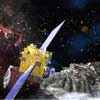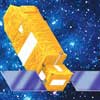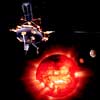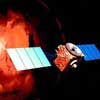|
Sunday:
June 24, 2001 | |
0001 GMT |
 |
Temperature map of Io presents a puzzle
Earth's tropics are hotter than the polar regions for a good reason, so scientists are puzzled that the same pattern doesn't show on Jupiter's moon Io. Powerful volcanoes and the previous day's sunshine warm the nighttime surface of Jupiter's moon Io, as seen in this image from NASA's Galileo spacecraft.
 FULL STORY FULL STORY
 |  |

|
 |
Europa's frozen surface
Europa, a moon of Jupiter, appears as a thick crescent in this enhanced-color image from NASA's Galileo spacecraft. Reddish linear features are some of the cracks and ridges, thousands of kilometers long, which are caused by the tides raised by the gravitational pull of Jupiter. Also visible are a few circular features, which are small impact craters.
 FULL STORY FULL STORY
 |  |

|
 |
DAILY BRIEFING Other stories making news today
|
 |
Cellular, macromolecular biotechnology research proposals picked -- NASA has selected 43 researchers to receive grants totaling approximately $27 million over four years to conduct biotechnology research on Earth and in space. This research will create knowledge in important areas of biotechnology such as tissue engineering, gene expression and biosensor technology.
|
 |
|
Saturday:
June 23, 2001 | |
1006 GMT |
 |
Rosetta - a spacecraft in search of pristine matter
In January 2003 the European spacecraft Rosetta is to launch on atop an Ariane 5 to comet "Wirtanen" in search of pristine matter. For a year, it will orbit this tailed star at a distance of one kilometer and explore it in detail. At the same time, a probe will land on the comet's surface for surface-science investigations and analysis.
 FULL STORY FULL STORY
 |  |

|
 |
Unique link found between stellar death and birth
Astronomers from the University of Colorado at Boulder and the University of California at Berkeley have discovered a key building block for new stars in the rapidly expanding remains of an ancient stellar explosion.
 FULL STORY FULL STORY
 |  |

|
 |
DAILY BRIEFING Other stories making news today
|
 |
Artificial intelligence: It's more than a movie -- Engineers at the Jet Propulsion Laboratory will talk about the real artificial intelligence work that takes place at NASA in a live webcast, scheduled for June 29, at 11 a.m. Pacific Time.
|
 |
|
Friday:
June 22, 2001 | |
0350 GMT |
 |
Grounded military weather satellite finally repaired
You could say fate was with the U.S. Air Force back in January when, after two scrubbed countdowns, a catastrophic problem that would have likely doomed the launch of a military weather satellite was detected while the craft was still on the pad.
 FULL STORY FULL STORY
 |  |

|
 |
NASA's Terra captures a world of sunlight and heat
The beginning of summer is an annual reminder that our world is driven by sunlight, and new Terra satellite measurements show just how much the Sun influences the Earth's climate system.
 FULL STORY FULL STORY
 |  |

|
 |
Satellite shows no El Nino in Pacific yet, but one due
While change may be on the way, the Pacific is still dominated by the strong, larger-than-El Nino/La Nina pattern called the Pacific Decadal Oscillation, according to the latest data from the U.S.-French TOPEX/Poseidon satellite mission.
 FULL STORY FULL STORY
 |  |

|
 |
DAILY BRIEFING Other stories making news today
|
 |
Expedition Two science operations status report -- The past week saw the Expedition Two crew and supporting controllers and scientists on the ground celebrate the team's 100th day of science operations onboard the orbiting research facility.
|
 |
|
Thursday:
June 21, 2001 | |
1600 GMT |
 |
Space shuttle Atlantis makes trek to launch pad
The space shuttle Atlantis made its slow trek today from the Kennedy Space Center's cavernous Vehicle Assembly Building to launch pad 39B in preparation for blastoff July 12 to deliver a $164 million airlock to the international space station. A rollout attempt Wednesday was aborted due to lightning.
 FULL STORY FULL STORY
 |  |

|
 |
Ulysses encounters massive coronal ejection
Most of the instruments on board Ulysses recently recorded their highest readings during the 10 years that the spacecraft has been in orbit. The cause was a spectacular coronal mass ejection which had left the Sun three days previously, heading towards the position in space that Ulysses was occupying.
 FULL STORY FULL STORY
 |  |

|
 |
Mars team takes Baikonur reconnaissance mission
Members of the Mars Express project and industrial teams travelled to the steppes of Kazakhstan last month to inspect the Baikonur cosmodrome where Mars Express will be launched on board a Soyuz-Fregat rocket in June 2003.
 FULL STORY FULL STORY
 |  |

|
 |
|
Wednesday:
June 20, 2001 | |
0450 GMT |
 |
Pegasus launch of HESSI postponed indefinitely
NASA has halted plans to fly its HESSI solar probe aboard an Orbital Sciences Pegasus rocket until investigators determine what likely caused the botched X-43A launch earlier this month. When HESSI will be launched is unknown.
 FULL STORY FULL STORY
 BUY THE MISSION PATCH! BUY THE MISSION PATCH!
 |  |

|
 |
Atlas launches foundation of ICO satellite system
The orbital assembly of a new wireless telephone and data relay satellite network began Tuesday when a Lockheed Martin Atlas 2AS rocket successfully launched the cornerstone spacecraft for the ICO system.
 FULL STORY FULL STORY
 MISSION STATUS CENTER MISSION STATUS CENTER
 |  |

|
 |
NASA firms up space shuttle launch schedule
NASA officials held a crucial meeting Tuesday and decided space shuttle Atlantis can launch on July 12 to deliver the Joint Airlock to the international space station. For a time, NASA considered delaying the mission until September due to troubles with outpost's new robotic arm. Shuttle Discovery will follow with its station crew rotation flight in August.
 |  |

|
 |
XMM snaps striking image of stellar activity, black hole
Europe's orbiting XMM-Newton telescope has obtained one of the most striking ultraviolet pictures ever taken of the galaxy M81. Strong ultraviolet emission is a feature of star formation, supernova explosions and the accretion of matter by a supermassive black hole.
 FULL STORY FULL STORY
 |  |

|
 |
Solar neutrino problem solved
Data from an unusual underground observatory have helped scientists solve a key mystery about the Sun, but have in turn raised new questions about fundamental particle physics, scientists announced Monday.
 FULL STORY FULL STORY
 |  |

|
 |
|
Tuesday:
June 19, 2001 | |
0001 GMT |
 |
Defrosting Martian sand dunes look like vegetation
As winter gives way to spring in the Martian southern hemisphere, NASA's Mars Global Surveyor is observing the retreat of the south polar frost cap. One of the most aesthetically-pleasing aspects of the spring defrosting process is the pattern that is created on the sand dune fields.
 FULL STORY FULL STORY
 |  |

|
 |
Thuraya begins commercial satellite phone service
Thuraya -- the satellite-based regional mobile communications system -- has started rolling out its service with the ultimate goal of covering a region encompassing approximately 2.5 billion people in 100 countries across the Middle East, North and Central Africa, Europe, the Indian subcontinent and Central Asia.
 FULL STORY FULL STORY
 |  |

|
 |
|
Monday:
June 18, 2001 | |
0411 GMT |
 |
Atlas rocket to put first ICO satellite into space tonight
The foundation upon which the ICO global telephone and data relay satellite system will be built is awaiting a late-night liftoff atop a Lockheed Martin Atlas 2AS rocket from Cape Canaveral, Florida.
 MISSION STATUS CENTER MISSION STATUS CENTER
 |  |

|
 |
Taurus XL rocket wins commercial launch order
Orbital Sciences has sold its first Taurus XL rocket, a more powerful version of the company's ground-launched vehicle. The mission will carry a Taiwanese remote sensing satellite into orbit in 2003 from Vandenberg Air Force Base, California.
 FULL STORY FULL STORY
 |  |

|
 |


 The Hubble Space Telescope's majestic view of the Eskimo Nebula. This spectacular poster is available now from the Astronomy Now Store.
The Hubble Space Telescope's majestic view of the Eskimo Nebula. This spectacular poster is available now from the Astronomy Now Store.